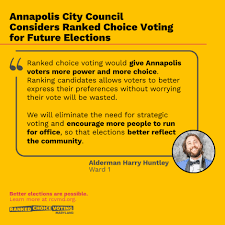Effort to introduce ranked choice voting in Annapolis promises fairer elections
The Annapolis City Council is considering an ordinance that would change municipal elections to a ranked choice voting system, which supporters argue would foster kinder, fairer elections, while some Annapolis Republicans object over fears of being marginalized.
The ordinance, introduced in late July by Harry Huntley and co-sponsored by fellow Democrat Rob Savidge, would apply to city elections starting in 2029. It passed on first reader and was referred to the Annapolis Board of Supervisors of Elections and the Rules and City Government Committee.
Implementing ranked choice voting was one of Huntley’s main motivations for seeking his City Council seat. It makes elections kinder and fairer, Huntley says.
“This is the single most important reform we can make to bring unaffiliated voters more into the political process,” Huntley said. “I believe this is not only good for Annapolis but one of the most important things we can do to save American democracy.”
Most U.S. elections use a “first-past-the-post” system — also known as plurality voting — where the candidate with the most votes wins regardless of whether they achieve a majority. Critics say the system is flawed because it allows a candidate to win with a relatively small share of the vote in crowded races.
Ranked choice voting is a less common system in which voters rank candidates in order of preference. If a candidate wins a majority of first-choice votes, they are the winner. If no candidate has a majority, the candidate with the fewest votes is eliminated and those ballots are reassigned to the next-choice candidate. The process repeats until there is a majority.
[…]
Michelle Whittaker, executive director of Ranked Choice Voting Maryland and a Montgomery County resident who advocates for ranked choice voting in Takoma Park, said in the nearly 20 years since switching to the system, feedback from voters and politicians has been overwhelmingly positive.
“I’ve seen how you get more of a collaborative or positive association between candidates,” Whittaker said.
At the meeting where Huntley introduced the legislation, several organizers with Ranked Choice Voting Maryland and Annapolis residents attended wearing T-shirts and carrying posters.
“In a time when record numbers of people don’t trust or like either major party, ranked choice voting is one of the ways we can start restoring democracy and trust in our government,” said Phil Atedo, an Annapolis resident who spoke during the meeting.
[…]
Robb Tufts, an Annapolis resident and Green Party voter, said unaffiliated and third-party voters’ ideas rarely gain traction in the current system, which is why he is in favor of ranked choice voting.
“I think it limits the number of voices that are heard during an election,” Tufts said. “Ranked choice voting would create an environment in which more candidates would be comfortable or encouraged to run for office regardless of their political affiliation.”
Independent research indicates that the system makes it easier for minority groups, like Republicans in Annapolis, to gain traction. Research shows the system, in general, incentivizes more centrist politics and discourages attacking opponents in campaigning. The National Conference of State Legislatures found a majority of voters understood the process and that the system might reduce political polarization, based on early evidence from Maine. Ranked choice voting shows it improves representation, campaign quality, mobilization and turnout, according to the American Bar Association’s Task Force for American Democracy.
“If I see someone has up one of my opponent’s yard signs, I will still go talk to them, because you’re trying to be their number two. You’re trying to find common ground with those people rather than just writing them off,” Huntley said.
The bill was referred to the Rules and City Government Committee, which will meet next on Sept. 8.
Source: https://www.capitalgazette.com/2025/08/15/ranked-choice-voting-annapolis-considered/

